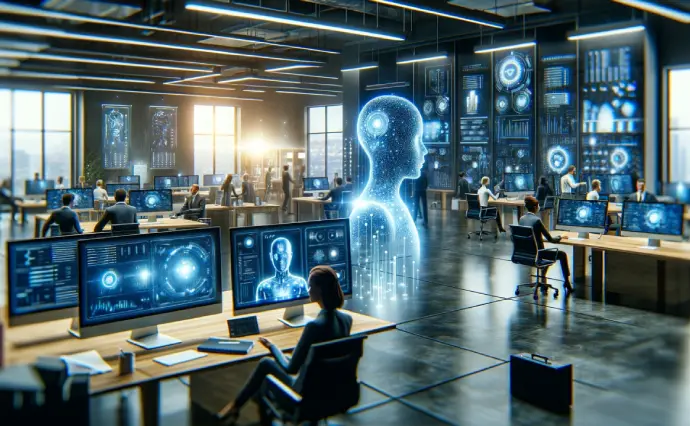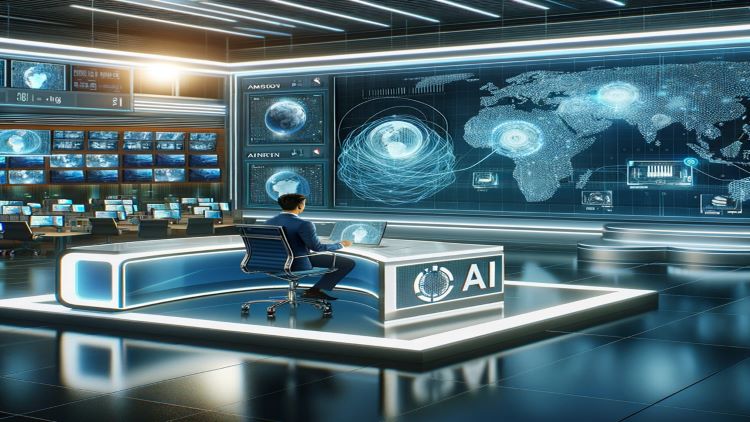The Role of AI has become increasingly prominent in our everyday lives, revolutionizing how we interact with technology. From virtual assistants that simplify tasks to complex algorithms that drive innovations, AI is reshaping numerous industries. Its rapid development is not just about enhancing efficiency but also about transforming the very essence of how we live and work.
Understanding The Role of AI is crucial in grasping its impact on the future. As AI technologies continue to advance, they promise to bring about significant changes in everything from healthcare to transportation. Exploring this role helps us appreciate the potential benefits and challenges, preparing us for a future where AI plays an integral part in our world.
The Role of AI: Understanding Its Impact
Artificial Intelligence, or AI, is a technology that has quickly become a big part of our lives. AI helps us in many ways, from making our daily tasks easier to improving how businesses operate. But what exactly is AI, and why is it so important? Let’s explore The Role of AI and how it affects us.
What Is AI?
AI refers to computer systems designed to think and learn like humans. For instance, AI can recognize voices, understand text, and even make decisions based on data. These systems use algorithms, which are like recipes for solving problems. They process huge amounts of information quickly, helping us in various ways.
For example, AI powers virtual assistants like Siri or Alexa. When you ask them a question, they use AI to understand your words and provide an answer. This technology makes tasks easier and saves time. Similarly, AI can analyze large datasets to find patterns and insights, which can be helpful in many fields, from medicine to entertainment.
How AI Is Changing Our Lives
The Role of AI extends to several areas in our daily lives. One major area is healthcare. AI helps doctors by analyzing medical images, predicting patient outcomes, and even suggesting treatments. For instance, AI can detect early signs of diseases like cancer, improving chances of successful treatment.
In education, AI is making learning more interactive and personalized. For example, AI-driven apps can adapt to a student’s learning pace, providing extra help where needed. This personalized approach helps students understand subjects better and succeed in their studies.
AI in Everyday Technology
Everyday technology is also influenced by AI. When you use social media, AI algorithms decide which posts and advertisements you see. These algorithms analyze your interests and interactions to tailor content specifically for you. This makes your online experience more engaging but also raises questions about privacy and data security.
AI powers smart home devices, such as thermostats that learn your temperature preferences and security systems that recognize faces, integrating seamlessly into our homes. These technologies make our lives more convenient and secure, showcasing The Role of AI in improving our daily routines.
The Future of AI
Looking ahead, AI will continue to evolve and play an even more significant role in our lives. Future advancements might include smarter robots, better healthcare solutions, and more personalized experiences. However, with these advancements come challenges, such as ethical concerns and the need for responsible use.
It’s essential to understand both the benefits and potential issues associated with AI. By learning about The Role of AI, we can be better prepared for a future where this technology is even more integrated into our world.

The Impact of AI on Jobs
AI is transforming the job market in many ways. Some tasks that were once done by humans are now handled by AI systems. For example, AI can automate routine jobs, such as sorting emails or managing inventory. This can make work more efficient but might also lead to job changes.
While some jobs may be replaced, AI also creates new opportunities. For instance, there is a growing need for people who can design, build, and maintain AI systems. Roles in AI development, data analysis, and cybersecurity are becoming increasingly important. Learning about AI and its applications can help you prepare for these future career opportunities.
AI in Entertainment
The Role of AI in entertainment is also notable. AI is used to create more engaging and personalized experiences. For example, streaming services like Netflix use AI algorithms to recommend movies and shows based on what you’ve watched before. This helps you discover new content that matches your interests.
In video games, AI is used to create intelligent and challenging opponents. This makes games more enjoyable and immersive. AI can also help in creating realistic animations and special effects, enhancing the overall gaming experience.
Ethical Considerations of AI
As AI becomes more advanced, it raises important ethical questions. For instance, how should we handle the data that AI systems collect? Ensuring privacy and security is crucial. We must also consider how AI decisions are made and whether they are fair and unbiased.
We must manage AI’s impact on society carefully. Developing guidelines and regulations ensures that we use AI responsibly. By discussing these ethical issues, we can work towards a future where AI benefits everyone while minimizing potential risks.
AI and Problem-Solving
AI is a powerful tool for solving complex problems. For example, AI can analyze climate data to predict weather patterns and help in planning disaster response strategies. It can also be used in scientific research to discover new materials or find cures for diseases.
In everyday situations, AI helps solve problems by providing useful recommendations and insights. For instance, AI-powered navigation apps can suggest the best routes to avoid traffic. This problem-solving ability makes AI a valuable tool in many areas of life.
Embracing AI
Understanding The Role of AI helps us embrace its benefits and address its challenges. AI is not just a technological advancement but a part of our future. By learning about AI and its impact, we can make informed decisions and use this technology to improve our lives.
As we continue to explore and develop AI, it’s important to stay curious and informed. AI will keep evolving, and our knowledge will help us adapt and thrive in a world where this technology plays an ever-growing role.
AI in Transportation
The Role of AI in transportation is transforming how we travel. Autonomous vehicles, or self-driving cars, are a significant development. These cars use AI to navigate roads, avoid obstacles, and make driving decisions. This technology promises to make travel safer and more efficient by reducing human error.
AI is also used in public transportation systems. For example, AI helps in optimizing bus and train schedules to improve service and reduce wait times. Traffic management systems use AI to control traffic lights and manage congestion. These improvements make our commutes smoother and more predictable.
AI in Communication
Communication is another area where AI is making a big difference. AI-powered translation tools help break down language barriers by translating text or speech in real-time. This makes it easier for people from different countries to understand each other and collaborate.
In addition, AI chatbots are commonly used on websites and in customer service. These chatbots can answer questions, solve problems, and assist users around the clock. They make it easier for businesses to provide support and for customers to get the information they need quickly.
AI and Creativity
AI is also making strides in the world of creativity. Artists and musicians are using AI to generate new ideas and create unique works of art. For example, AI can compose music, design graphics, and even write stories. This technology can inspire new forms of creative expression and push the boundaries of what is possible.
AI tools can help artists by providing suggestions or automating repetitive tasks. This allows them to focus more on their creative processes and explore new ideas. As AI continues to develop, it will likely play an even bigger role in the arts and other creative fields.
Learning About AI
Understanding The Role of AI is important for anyone interested in the future of technology. Learning about AI can open up new opportunities and help you prepare for a world where this technology is everywhere. Many schools and online platforms offer courses and resources to help you learn about AI.
By studying AI, you can gain valuable skills and knowledge that will be useful in various careers. You’ll also be better equipped to understand and navigate the changes AI will bring to society. Whether you want to work in technology, art, or any other field, learning about AI is a step towards a brighter future.
FAQ
Q; What is AI and how does it work?
AI, or Artificial Intelligence, refers to computer systems designed to mimic human thinking and learning. It works using algorithms that process large amounts of data to recognize patterns and make decisions. For instance, AI can understand speech, identify images, and solve problems by analyzing data.
Q: How is AI used in everyday life?
AI is used in many everyday applications. For example, virtual assistants like Siri and Alexa use AI to understand and respond to voice commands. AI powers recommendation systems on streaming services, smart home devices, and navigation apps that help us find the best routes.
Q: Will AI replace jobs in the future?
AI might automate some jobs, especially those involving repetitive tasks. However, it also creates new job opportunities in areas like AI development, data analysis, and cybersecurity. Adapting to these changes and learning new skills can help you stay relevant in the job market.
Q: How does AI impact privacy and security?
AI collects and processes large amounts of data, which raises privacy and security concerns. We must use AI responsibly and protect data. Many organizations are working on guidelines and regulations to address these issues and safeguard personal information.
Q: Can AI be creative like humans?
Yes, AI can assist in creative tasks, such as generating music, designing artwork, and writing stories. While AI can produce impressive results, it still relies on human input and creativity. AI tools can enhance creativity by providing new ideas and automating certain processes.
Conclusion
In summary, The Role of AI is vast and growing. It impacts various aspects of our lives, from improving healthcare to enhancing our daily activities. As AI technology advances, it will bring more changes and opportunities. Understanding how AI works and its potential effects helps us appreciate its significance and prepares us for the future.
The Role of AI is vast and continues to grow. From transforming everyday tasks to influencing the future of work, AI is changing our world in many ways. By understanding its impact and embracing its potential, we can make the most of this exciting technology. Staying informed and curious about AI will help us adapt and thrive as we move forward into a future shaped by innovation.
